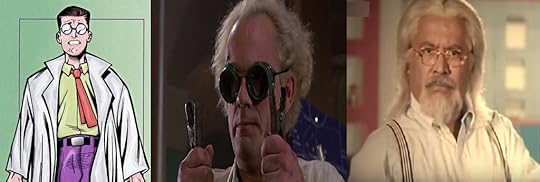What do you think?
Rate this book


222 pages, Paperback
First published January 1, 2005

Leonard Mlodinow [LM] es un físico teórico que en su tesis doctoral propuso un enfoque completamente novedoso que permitía resolver muchos problemas conocidos de la física de una manera mucho más simple. A grandes rasgos, su modelo suponía que el Universo tenía infinitas dimensiones espaciales, lo cual permitía, de alguna retorcida manera, simplificar todos los cálculos de los problemas más famosos de la mecánica cuántica. Esta tesis le consiguió el acceso a los mejores puestos de investigación en física teórica, y el eligió el Caltech (California Institute of Technology), donde a la sazón se encontraban nada menos que Feynman y Gell-Man, dos de las mejores cabezas que se han dedicado a la física teórica. Su despacho era la puerta contigua del de Gell-Man, y al otro lado tenía a la secretaria del departamento, Helen Tuck, todo un carácter que daría para otro libro, y después a Feynman. Eso es tener un despacho bien situado.
LM cuenta en este libro su experiencia de aquellos años. El Caltech tenía una política bastante razonable en algunos de sus contratos: a Mlodinow le pagaban el sueldo para que hiciese lo que le diera la gana, literalmente. Podía dar clase si quería, o podía no darla. Podía dedicarse a la jardinería. Podía investigar en matemáticas, biología o geología. Básicamente le estaban pagando porque era un tío brillante y querían tenerlo en su plantilla, ya que hiciera lo que hiciese al Caltech le beneficiaría. Nostámal como política de contratación. Otros en la plantilla gozaban de este mismo privilegio. Sin embargo, a LM le aterraba que se fiasen tanto de él. Llegó al Caltech en pleno bajón creativo, y anduvo charlando con todos los que allí investigaban para ver si algo de lo que hacían le interesaba y podía ser útil.
Entre las personas con las que habló estaba, por supuesto, Feynman, quien da nombre al libro y tenía que salir por algún lado, ¿no? LM tuvo varias charlas con Feynman, acerca del proceso creativo en física, del amor por la ciencia, del significado de ser científico, de muchísimas cosas. LM se centra en la figura de este físico legendario. Feynman andaba por entonces en sus últimos años. La supervivencia a su raro tipo de cáncer de estómago era de un 10% a los 5 años, y él llevaba 4 años luchando cuando LM llegó al Caltech. Finalmente Feynman conseguiría retrasar lo inevitable seis años más. Pero en esos últimos años a Feynman le dio tiempo a hacer muchas otras cosas, entre ellas esclarecer el desastre del Challenger, del que hablaremos en otra ocasión, porque pocas veces ha habido una bofetada científica tan grande en directo por la televisión.
LM habla también de John Schwartz y los que con él trabajaban, contra viento y marea (es decir, contra la falta de interés y de financiación), en la teoría de cuerdas, y de Murray Gell-Mann, a quien critica veladamente por el artículo que sobre Feynman escribió a la muerte de éste. Nadie niega que Gell-Mann era un genio, pero a todo el mundo parece caerle mejor Feynman.
LM habla de la distinción que hacía Feynman entre físicos “griegos” y “babilónicos”:
Feynman solía decir que había dos tipos de físicos, los babilónicos y los griegos. Se refería con ello a las filosofías contrapuestas de aquellas antiguas civilizaciones. Los babilónicos dieron los primeros pasos de la civilización occidental al comprender números y ecuaciones, y también en geometría. Pero fueron los griegos posteriores –en particular Tales, Pitágoras y Euclides– quienes han sido reconocidos como los inventores de las matemáticas. Ello se debe a que a los babilónicos sólo les preocupaba si un método de cálculo funcionaba o no –es decir, si describía adecuadamente una situación física real– y no si era exacto o si en ajaba en un esquema lógico mayor. Por el contrario, Tales y sus seguidores griegos inventaron la idea de teorema y demostración, y exigían que para que un enunciado se considerase verdadero tenía que ser una consecuencia lógica exacta de un sistema de axiomas o hipótesis explícitamente establecidos. Para ponerlo de forma sencilla, los babilónicos se centraban en los fenómenos y los griegos en el orden subyacente. [...] Feynman se consideraba un babilónico.
El libro está muy bien, es humano, es entretenido y abre las puertas a muchos temas sobre los que pasa levemente, dándonos ganas de saber más. Está bien escrito y todos los temas son de interés. Es un libro corto que se lee muy rápidamente y nos deja con una sonrisa, pensando en ese gran tipo que fue Feynman, y en la inmensa suerte que debió de ser compartir pasillo con él.
Mi nota: Muy recomendable.